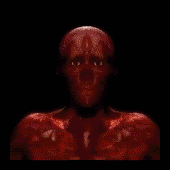Blind Man Sees With Subconscious 3rd Eye
Listen Now [3 min 57 sec] add to playlist
Morning Edition, December 23, 2008 · Scientists are reporting the remarkable case of a blind man who can see.
The case involves a middle-aged male physician living in Switzerland, who is known only by the initials "TN." A few years ago, TN had two strokes, one on either side of his brain. The strokes severely damaged the part of the brain primarily responsible for vision, known as the occipital cortex.
Extensive testing of TN confirmed that even though his eyes were just fine, he was completely blind. He couldn't see objects held in front of him and used a cane to get around. Ask him if he could see, and TN would reply, "No, I'm blind."
But neuroscientist Beatrice de Gelder wanted to study TN further. She is affiliated with Tilburg University in the Netherlands as well as Massachusetts General Hospital in Boston. First, she and her colleagues repeated tests on TN to satisfy themselves that he was indeed blind.
Then they laid out an obstacle course in a hallway. The obstacles consisted of everyday objects.
"One was a typical paper basket; one was a stack of books," says de Gelder. "They all had different shapes and sizes."
She then told TN to walk down the hall.
"We didn't give him information about obstacles or anything. So he was not aware that there were obstacles."
So TN walked down the hall, but instead of walking straight ahead, he carefully stepped around each of the obstacles.
"He never touched any of it. We were like totally amazed," says de Gelder, who reports her finding in the journal Current Biology. You can see this test by clicking on the video link above.
For his part, TN was surprised that the scientists were surprised.
"Since he had not seen any object, he wasn't aware of having achieved anything sensational," de Gelder says.
TN has what is known as blind sight, according to de Gelder. Even though the primary part of his brain that processes visual information is destroyed, he still has more primitive parts of his brain intact, and these are capable of doing some visual processing. After all, one of the most basic functions of the visual system is to help an animal avoid obstacles or predators. TN still has some visual abilities — he's just not aware he has them.
Steven Hackley, an associate professor of psychological sciences, says studying patients such as TN will tell scientists about the nature of consciousness.
"The idea is that by comparing the same mental process when it is conscious and when it is not, it will be possible to determine which parts of the brain are essential and how consciousness arises," Hackley says.


















No comments:
Post a Comment